How Entrepreneurship Is Creating Change in Prisons Across Colorado
Towering American elms surround the grass lawn of La Vista Correctional Facility’s center courtyard. Dozens of incarcerated women sit together in conversation, milling around tables and benches in the Level III women’s prison, an occasional outburst of laughter piercing the air.

Defy Colorado volunteers gather in La Vista's courtyard.
Whisking a rack of blue graduation gowns along the edge of the courtyard, Stacey Putka, Defy Colorado’s executive director, makes her way to the prison gym to set up for the next day’s graduation. For the past eight months, Putka and others in Defy have been teaching women – some of whom have never held a job, or even graduated from high school – about what it takes to be an entrepreneur.
Nearly 20,000 men and women are incarcerated in Colorado, around half of whom are released every year. Defy’s students make up a small percentage of those totals, but the program aims to make a big impact on one number: the 54 percent of released inmates who return to prison within three years, with many citing barriers to employment as a major factor of their reincarceration.
“It’s about … entrepreneurship as a vehicle to making us better people."
– Joy, Defy Colorado graduate
A Different Approach
To take on such an intractable challenge, Defy Colorado goes beyond explaining the basics of business and teaching skills like how to structure a resume. Instead, Defy dives deep into the lives of its entrepreneurs-intraining to help them develop new business ideas, many of which are forged from unexplored passions and harrowing personal experiences.
In small groups, with scores of volunteers and business leaders in tow, the Defy students come together each week on the linoleum basketball court at La Vista. They review homework, get feedback on their entrepreneurial ideas, and discuss concepts such as creating business plans and making sense of target markets. They also talk through the decisions that led them to be imprisoned in the first place and figure out better ways to address family conflict, friendship, and mental health issues.
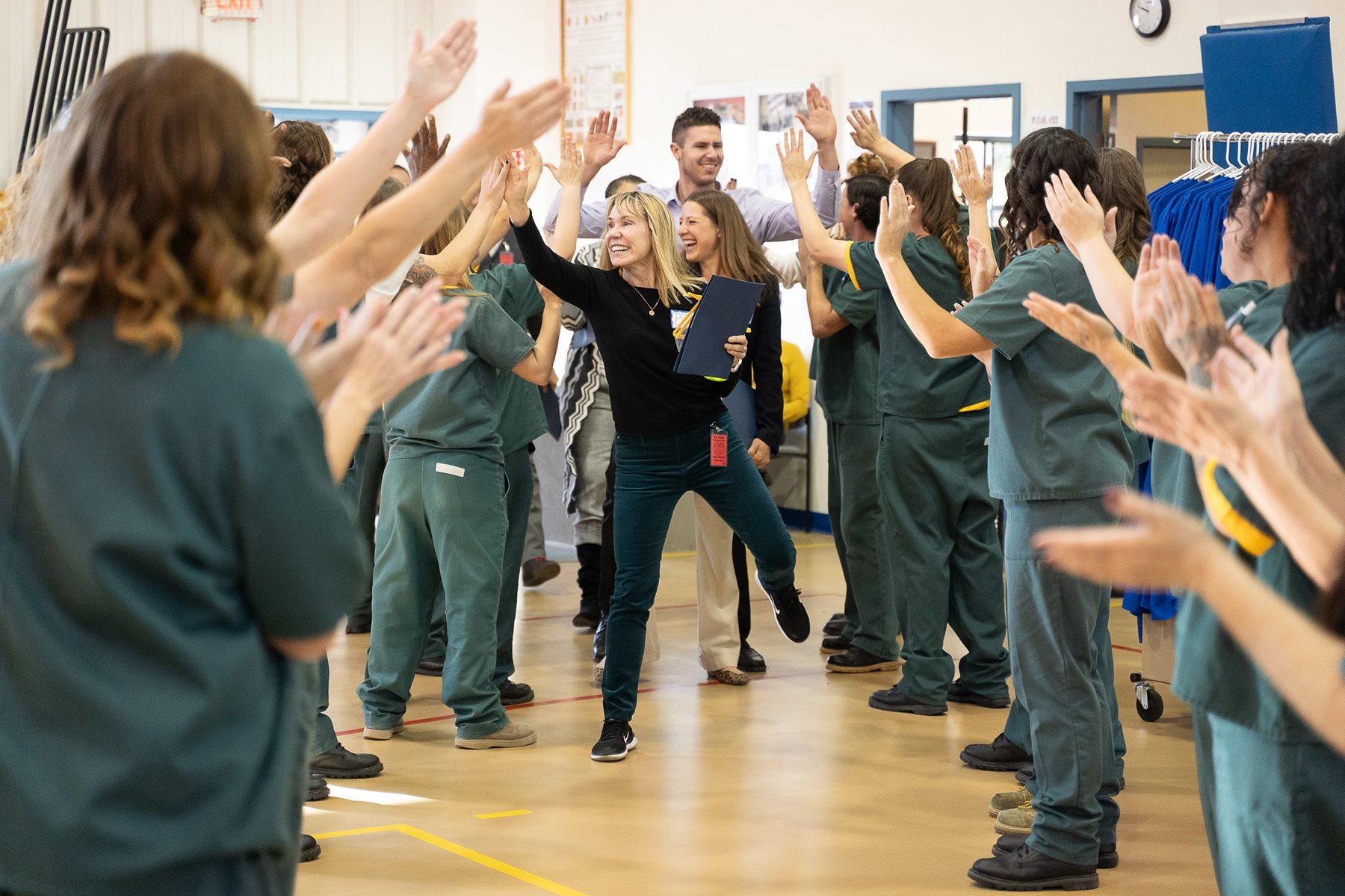
Defy Colorado volunteers are welcomed by students in the program at La Vista.
An Entrepreneurial Partnership
Enter the CSU College of Business Institute for Entrepreneurship
“I always feel like a university’s success is defined by how they bring up their surrounding community, and that community extends to those who need the most help,” said Institute for Entrepreneurship Director Scott Shrake, who has forged a relationship with Defy around the shared goal of increasing access to life-changing entrepreneurial education.
Shrake has spent the past two years designing a suite of programming focused on providing a zero-barriers entrepreneurship experience to CSU students and community members. Now, he and the Institute are bringing that inclusive approach to Colorado prisons, along with dozens of people from CSU and companies such as Otter Products who are volunteering their time to work with incarcerated men and women.
“For released inmates, it’s incredibly difficult to find work,” said Shrake. “Teaching entrepreneurial skills helps them get a leg up when they already have to work three times as hard to go half as far. “When people wonder why we get involved, our success brings the recidivism rate down to single digits.”
"I won't accept the status quo as the answer. So, I'm continually looking for ways to innovate, to improve what we're doing."
– Scott Shrake, Director, Institute for Entrepreneurship and ColoradoBiz Top 25 Young Professional
‘We Can Accept Responsibility and Move Forward’
Joy, who works as a pre-release clerk at La Vista and is serving her second sentence, knows just how hard it is to reduce recidivism. “When I was here last time, on paper it looked like, ‘Oh, OK, she’s absolutely going to be successful,’” said Joy, referring to her outward appearance during her last incarceration. “I took programs, but I hadn’t really worked on my core issues ... clearly, I didn’t learn what I needed to learn.
“We’re never going to be able to undo what we’ve done, but we can accept responsibility and move forward,” said Joy. “Yes, we did something wrong. Yes, we need to be here. Yes, we’re being accountable. … But that people still believe in us, that is huge.”
Providing a First Chance
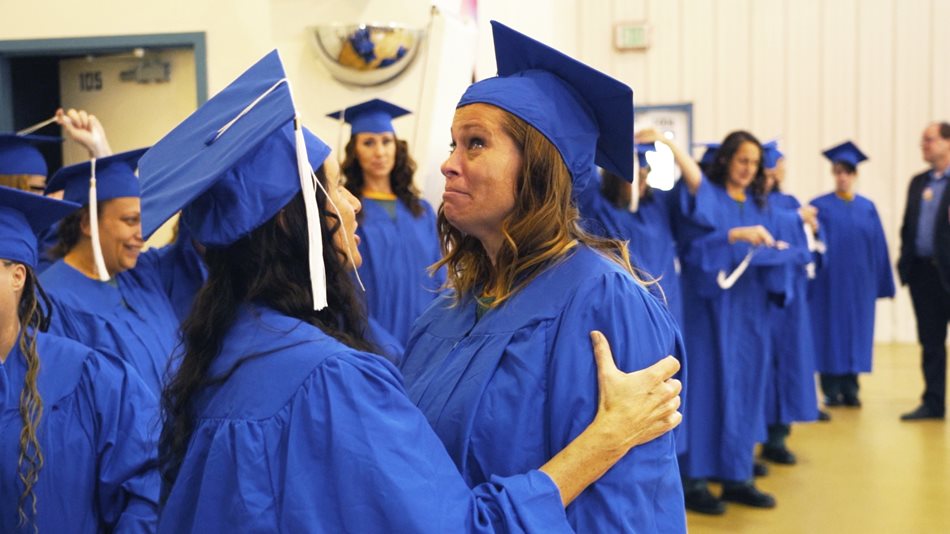
A Defy student who never graduated from high school tears up ahead of the group's graduation ceremony.
Defy students include people who are looking forward to upcoming release and others with life sentences.
Men and women in Defy have committed violent crimes, led gangs, run burglary rings, and made those in their communities feel less safe.
However, in Defy’s students, Putka also sees people with invaluable insights whose storied life experiences put them in unique positions to touch the lives of those who have been forgotten and effect positive change.
“Someone finally sees the potential in us. Somebody sees that we aren’t just this number, that we are not these cast outs. Somebody finally sees that we can make something out of our lives. ”
– Alexis, Defy Colorado graduate
“Many of our students have been afforded few opportunities throughout their lives, and we believe in offering them a chance – oftentimes their first – to truly point their lives in the right direction,” Putka noted.
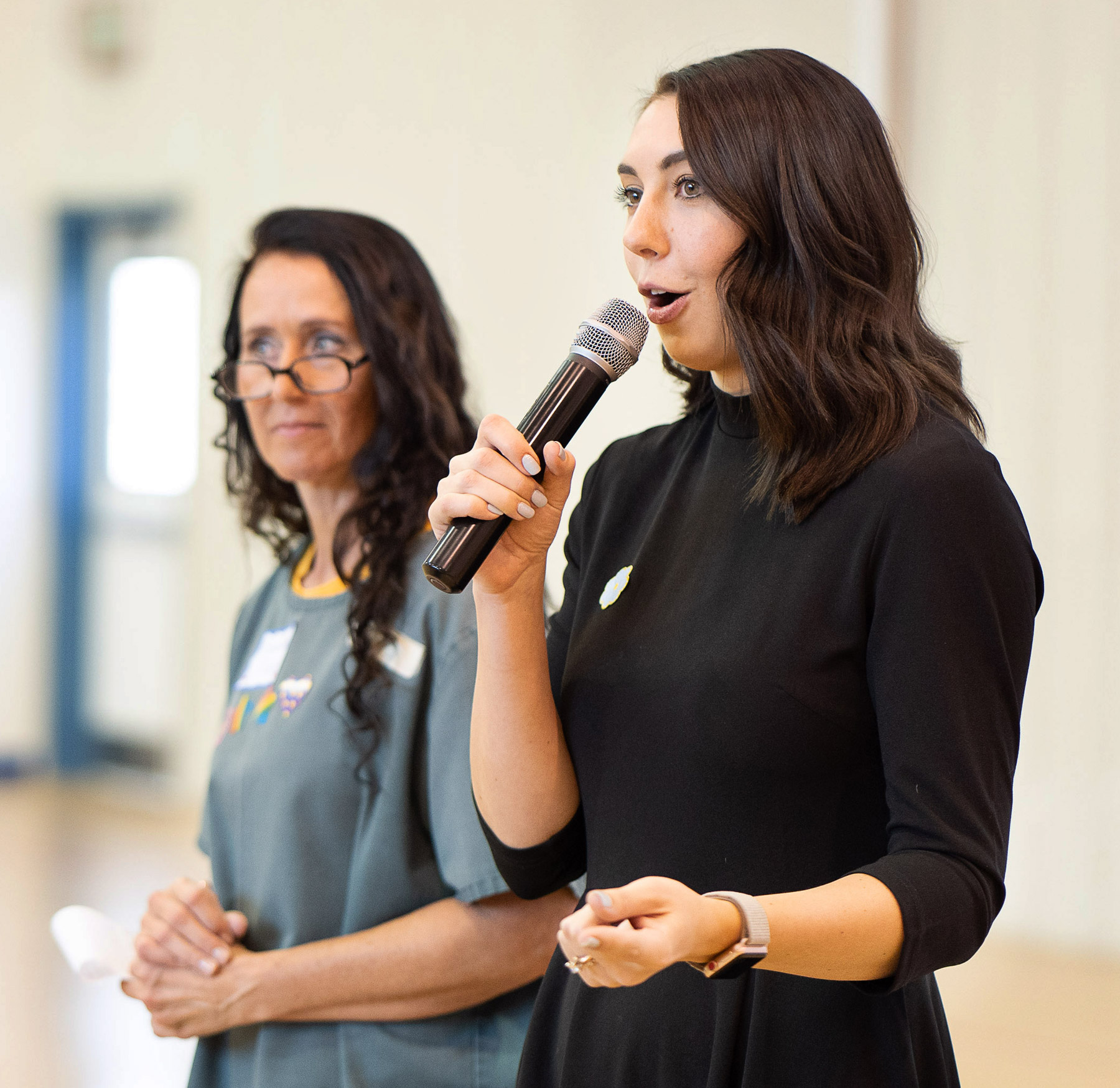
Stacy Putka speaks at Defy Colorado's La Vista graduation.
“For example, we had a guy who used to be a gang leader and, after graduating from the program, he started a gang intervention program,” said Putka. “Another student of ours struggled with anger issues, but it was really a symptom of his mental illness, something he realized through our program. He used that experience to start a mental health art therapy group where he began to engage with the world in a kinder way, encouraging his peers to join him.”
Beyond anecdotes, the program’s numbers also point toward broad and meaningful impacts. Defy Ventures’ graduates nationally reoffend at a much lower rate than average – 7 percent vs. 30 percent – within one year of release and are also employed at nearly twice the rate of other released inmates, according to the organization.
A major part of encouraging people to change is winning over inmates who have been incarcerated the longest and who are often written off first, says Putka.
She points out that wardens at the prisons where Defy operates credit the program’s inclusion of longer-serving inmates with reducing incidents of violence and even gang involvement and activity.
“You have to want to be able to look deep inside, figure out why you're acting the way you are, want to change that behavior, and then do everything in your power … to help you change.”
– Sara, Defy Colorado graduate
“People with life or long sentences set the culture,” said Putka. “They’ve established themselves as leaders within the facility.”
Sara and Joy discuss Defy's role in their rehabilitation
Putka likens the experience of entering prison for the first time to first-year students starting high school and looking up to the seniors – or, in this case, looking up to those who may never see their sentence end, who understand the system, or who have proven themselves in rough circles outside prison.
“A lot of times when people get incarcerated, they come out a better criminal than they went in,” said Putka. “At the end of the day, [the vast majority] of the people who are incarcerated are going to come back to their communities.”
Leading Change
After eight months in Defy’s program, Cheryl is preparing to celebrate her graduation, yet after 25 years of incarceration there is still no clear end in sight for the high school dropout who started her 96-year sentence at 17.
“I was thrown in with the adult population as soon as I got to prison,” said Cheryl. “I grew up in here.”
“In my earlier years I was a very angry, bitter person. I could have taken the path of negativity.”
But eventually, she got tired of that mindset.
“I thought to myself, ‘Even if I have to spend my life in this place, I want there to be a quality to my life, and I want to not be defined by my worst mistake,’” said Cheryl. “I want to show the world that I can not only be a better person, but that I can help other people who are struggling, too.”
"I want to be a good person even if I'm incarcerated. I want to help other people. Now is the time for me to start giving back everything I have learned on my journey."
– Cheryl, Defy Colorado graduate
Defy gave Cheryl a way to channel her desire to give back into a business model centered around sharing her experience in a way that can help other women. Her business aims to build a supportive network of resources and encouragement for women who feel trapped in dysfunctional situations.
“I want to help people who are in a dark place, I hope to help lift them out of that,” said Cheryl, who cites her pre-prison experiences – being around gang activity, substance abuse, and social conflicts – and the hard-fought lessons she’s learned while incarcerated with giving her a perspective she wants to share with women in crisis:
“There is light at the end of the tunnel, no matter what their circumstances are.”
While pursuing her goal of building a business to help lead women through their challenges, Cheryl realized she had been leading the women at La Vista by example, without really meaning to.
“I've found that one of the best things you can do is change yourself, because you can't help other people until you help you, and so that's where I started,” Cheryl said.
“I got my master's degree in here, I've started a business in here, I haven't been in trouble in here for 18 years, I'm doing a lot of positive things with my time and that kind of inspires the women to want to do better things for themselves.”
Inspired to Meet Her Potential
Alexis carries herself with the same positivity and hopefulness as Cheryl for a simple reason: “It’s a must to survive in here.”
Alexis describes the importance of positivity in prison
Her cheerful attitude stands in stark contrast to the negativity that could easily overwhelm someone facing a 20-year prison sentence.
“Defy has changed my life exponentially,” Alexis said.
She lights up when talking about her love of art – its stories, emotions, and escapism – and her business plan to source illustrations from inmates around Colorado for a clothing line.
“You can get caught up in the mix so easy, and so when this program came through … I was like, ‘Okay, someone finally sees the potential in us. Somebody sees that we aren't just this number, that we are not these cast outs. Somebody finally sees that we can make something out of our lives.’”
Taking a Different Path
During Shrake’s first visit to the maximum-security Colorado State Penitentiary in Cañon City, which houses some of the state’s most violent and disruptive inmates, he found himself sitting across from an incarcerated man who had been violently initiated into a gang when he was only 8 years old and was arrested four times before he turned 16.
“You use up all of your emotional capacity when you’re in there.”
– Scott Shrake
“I know how meaningful it can be to have a helping hand and guidance in a different direction,” said Shrake, who grew up in a blue-collar area outside of Chicago, where many of his friends and classmates ended up in prison.
“I was there talking with people who were getting out in two weeks and people who were in for double life sentences. They were both talking about their ventures, and going out and making them successful, to a degree where I had no idea who was who, and who was getting out when,” Shrake said.
‘We Never Lost Hope’
In addition to the concrete measures such as reduced recidivism, some of Defy’s outcomes can be more difficult to quantify, but the impacts on students’ lives are profound.
If only for an afternoon, sitting together in their deep blue caps and gowns and waiting for their names to be called, the Defy students didn’t look like prisoners, they looked like graduates. Tears and applause filled the gym as name after name was called to accept a Certificate of Entrepreneurial Achievement from the Institute for Entrepreneurship.
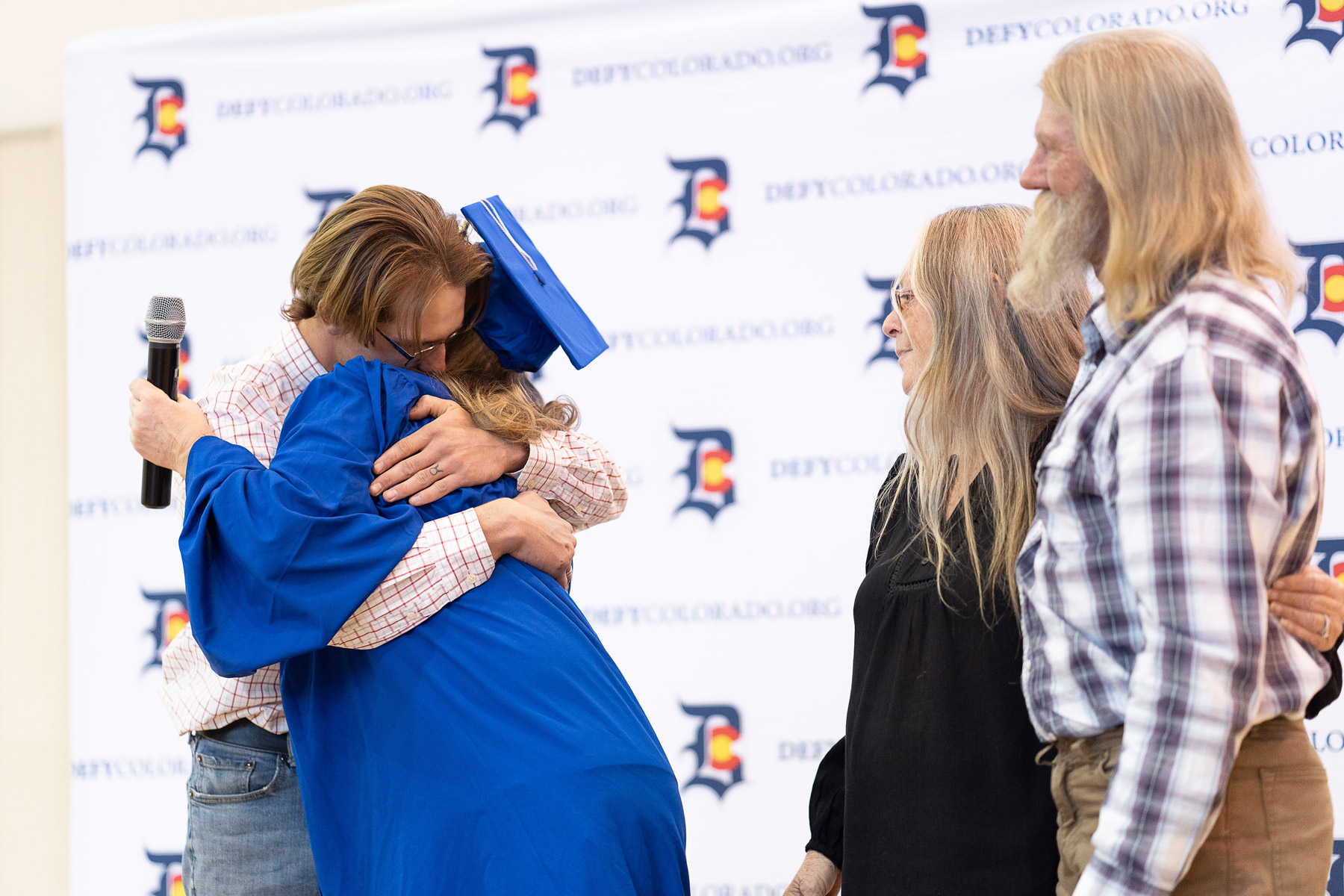
Jade hugs her son following Defy Colorado's graduation ceremony.
Among those waiting to hear her name called was Jade, who learned how to better express her feelings to her family through Defy’s curriculum. During the program, Jade wrote to her parents and started the process of reconnecting with them and her son – whom they raised – after a restraining order against her separated their family.
“Defy helped me have hope, and it’s helped me reunite with my family,” she said.
At the end of the ceremony, Jade stood in front of the crowd and spoke directly to her family. She shared how the moment felt.
“I feel connected, I feel loved, I feel wonderful. This is the proudest day of my life. Thank you,” said Jade, before pulling her mom, dad, and son together in a tight hug.
After graduation, Jade’s father, Stan, reflected on seeing his daughter in a cap and gown for the first time, having grown in a way he had long waited for.
“It’s been a rough road all the way around,” said Stan. “But we never lost hope, and we never lost our love for her.” As family and friends prepared to leave, with the sun beginning to set over the mountains, Stan shared one of his prayers: “It will be all different when she comes out.”
Jade is confident it will be. “I’ve done what I can to transform myself,” said Jade. “When I do get out, I will succeed, and Defy has given that to me.”
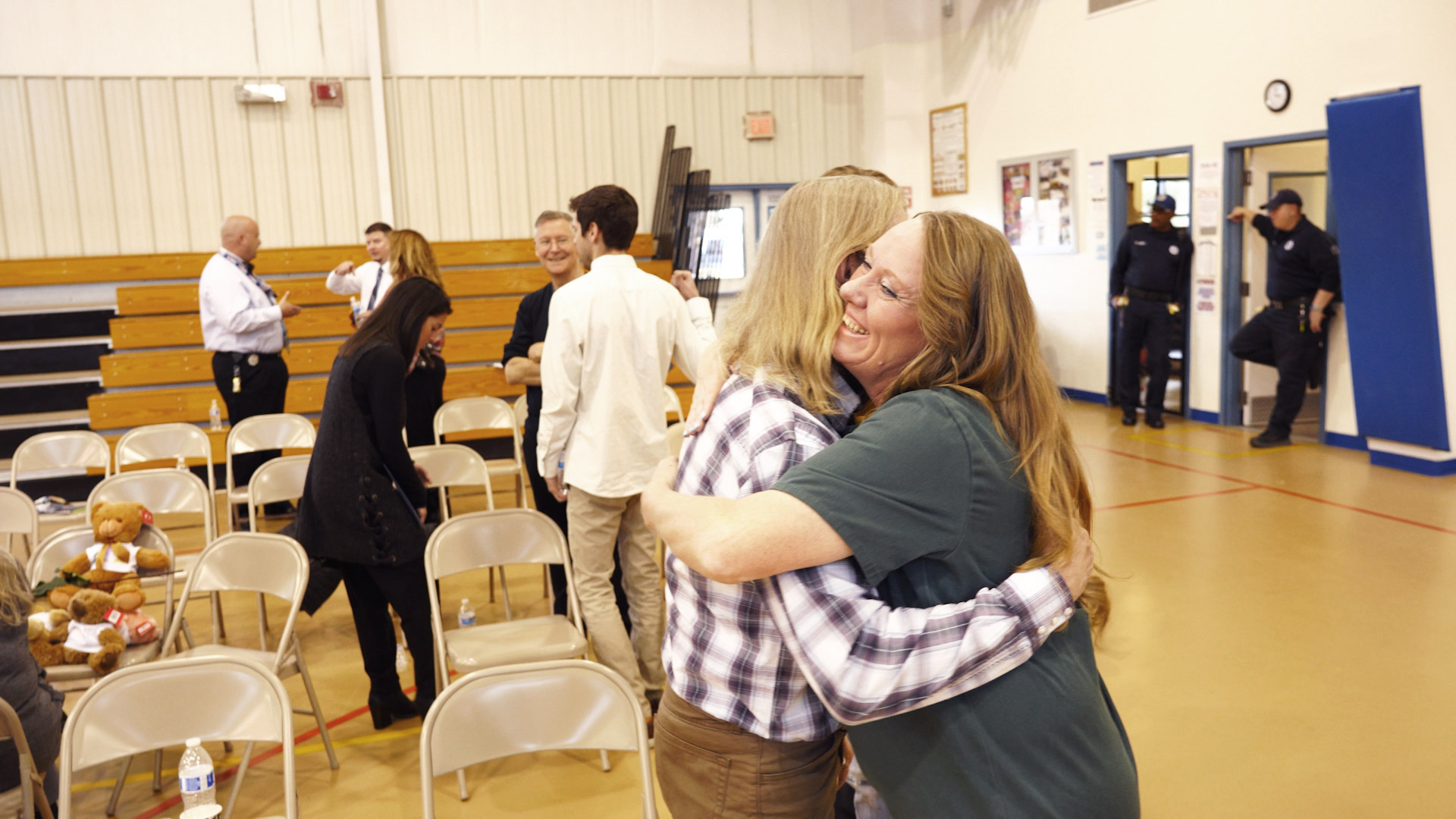
Jade hugs her father, Stan, following Defy Colorado's graduation ceremony.
Learn More: The College of Business Institute for Entrepreneurship
The Institute’s upcoming efforts build on its successes connecting passionate students and professionals across disciplines. These initiatives extend to new spaces such as the defense industry, restaurant accelerators, and design thinking at the K-12 level, which is funded with a donation from OtterCares.
Hands-On Education
The Institute provides CSU students and community members with access to free workshops that provide invaluable applied experiences developing and validating business ideas, collaborating with classmates across disciplines, and putting entrepreneurial concepts into action.
Startup Support and Mentoring
The Institute offers programs to help existing startups grow and connects entrepreneurs with seasoned business experts through a network of professionals and mentors.
Learn More
Alumni Feature: Ray Boucher
College of Business alumnus and trial lawyer Ray Boucher has built a successful career on his sense of social justice.
Banking for Good
FirstBank supports Northern Colorado through its "Banking for Good" initiatives.
Business and Biodiversity
College of Business faculty members Tom Dean and John Macdonald discuss how business can preserve Earth's biodiversity – and why it should.